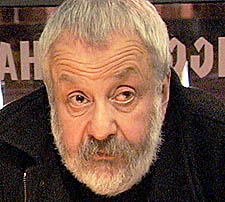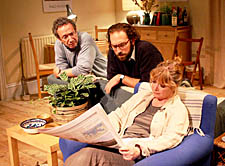|
|
 |
| |


Leigh’s Two Thousand Years sold out before it even
had an ending |
Leigh and the art of ad hoc film-making
As part of Jewish Book Week,
Mark Lawson spoke to film director Mike Leigh about the collaborative
nature of his work, writes Matthew Lewin
ACCLAIMED film and theatre director Mike Leigh gave his audience
a fascinating insight into the unique way be puts together his
award-winning films and plays at a sell-out session of Jewish
Book Week last Sunday night.
It included the revelation that, for example, none of the
other actors rehearsing for the film Vera Drake had any idea
that Imelda Staunton’s character was an abortionist until
the actors playing the police came to take her away.
“Not only is that true, but it’s true of every single
situation that has ever occurred in every project that I have
ever done,” Leigh said. “That is because the actors
never know anything except what their character would know during
the development stage and the improvisations. That’s what
makes it real. For me, that’s standard procedure.”
Earlier in the discussion with BBC arts journalist Mark Lawson,
Leigh was asked whether his recent play at the Cottesloe Theatre,
Two Thousand Years, which had a Jewish theme, together with
his appearance at Jewish Book Week constituted any kind of public
statement about his Jewishness.
Leigh replied: “If you are asking me whether I am deliberately
‘coming out’‚ as a Jew, the answer is no. If
I haven’t dealt with Jewish issues in the past it has not
been a question of avoiding the issues.
“I would say that all of my work is quite Jewish in its
way, without consciously being concerned to present itself as
such or indeed advertise itself as such – in the sense
that I deal with life in its tragic-comic perspective and in
a way there is something quite Jewish in that.”
But when he was invited to create a play for the National Theatre
by artistic director Nicholas Hytner, he decided that perhaps
it was time to deal more specifically with some Jewish issues,
with characters drawn very much from a world that was familiar
to him.
And when he set about casting the play, he insisted on using
only Jewish actors. “I have had a bee in my bonnet for
years that, on the whole, Jews are often played implausibly
by non-Jewish actors. I decided to get together a gang of Jewish
actors because I needed people who could bring to the project
experience which was more than just acting.”
He also revealed just how terrifying it was when the booking
opened for Two Thousand Years and they had only just started
the process of creating it.
“Within a week all 16,000 tickets had sold out, despite
the fact that we didn’t even have a title for it yet,”
he said. “I have to tell you that at that stage there was
no play! It is terrifying to be told by enthusiastic people
that all the tickets had been sold, when we didn’t yet
have a play!”
Then came the revelation that the reason why the play’s
first two preview performances were cancelled last year was
because they had not yet decided on how the play should end.
“Nic Hytner, who is a pretty sophisticated guy, spotted
that without an ending, it probably wouldn’t be a good
idea to put the play on,” he said.
The play has since been acclaimed by most of the critics and
has been touring the country before coming back to the National
Theatre and the larger Lyttelton Theatre in a few months time.
But the bulk of the discussion centred around the unique way
Leigh works with his actors to produce his plays and films,
and it amounted to an absorbing master class in the art of dramatic
creation.
“All art is a synthesis of improvisation and order,”
he explained.
“You put a mark on a canvas and then you work on it and
put order to it, but it started as an improvisation. All artists
interact with the material and go with what happens, although,
at the same time, they have a notion, a preconception or a conception
of what it should be. That conception might shift and change
and grow and expand and contract, whatever the medium is –
and that is what I do.
“There are some ideas about what might happen in a play
or film, but the name of the game of what I do is create characters
and put them together to create a whole organic world that lives,
and through which things develop and ultimately happen.”
Eventually, however, a finished product does emerge that becomes
permanent. “Yes, there is now a play, and it is at the
printers at the moment. They all wind up being very precise
and distilled and written down, so that anyone who now comes
into the play as a new actor, comes into a finished play. But
there is always room for good actors to bring some improvisation
to their parts.”
Asked by Mark Lawson whether there had been a “lightbulb
moment” when he discovered this way of working, Leigh replied:
“Not really. It happened over the course of the first half
of the 1960s, when I was very interested in all kinds of things,
including what was happening in the cinema at the time. What
was perhaps closest to a lightbulb experience for me was Peter
Brooke’s production of the Marat/Sade.
“I saw a film about how he had taken his actors to a mental
hospital and they had all chosen a case to use in their characterisation.”
Leigh dealt forthrightly with members of the audience who appeared
to irritate him. One man, who suggested that socialism and Judaism
had never been very happy bedfellows, was told he had made a
“ridiculous statement”.
And to another man, who expressed surprise at the number of
“f-words,” as he described them, in the recent play,
Leigh replied: “I have nothing further to say, so fuck
off.”
|
|
 |
|


